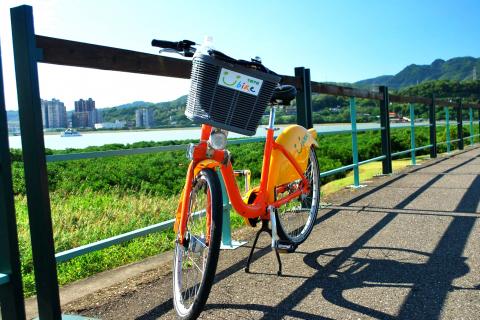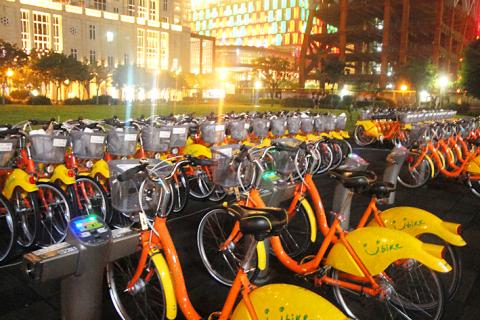Walking into bowels of Taipei’s Mass Rapid Transit system for the first time can be a bewildering experience. The same can be said about the Taipei City Government’s highly ambitious Youbike bicycle sharing system. But once you’ve signed up, used the service once or twice and figured out where the stations are, Youbike is a breeze.
Since Youbike stations are popping up all over the city, the Taipei Times wanted to get some feedback from users. There are two ways to get started with Youbike — EasyCard or credit card. If you already have an EasyCard, simply go to the Web site (www.youbike.com.tw/home.php) and click on the member icon. After following the instructions in English or Chinese, an SMS is sent to your mobile phone for confirmation and you can head directly to any of the stations to use a Youbike. The first 30 minutes of every rental are free and every 30 minutes after that is NT$10.
On the road

Photos: Marcus Aurelius and Lindsey Leamen
Using a credit card should be even easier, since all riders have to do is go to a Youbike kiosk and flash the credit card (as long as it has a microchip) and pick a bicycle. However, the credit card service is only available at 31 out of the 41 stations (mostly in the Xinyi District, 信義), and this is only marked on the physical map, not the one on the Youbike Web site.
Kate Lin (林雅婷) learned about Youbike from her co-worker and now uses the service at least twice a week.
“I enjoy doing this because I don’t get much chance to exercise during the week,” Lin said. “Also, there’s only one bus I can take home, and sometimes I have to wait a long time for it. Riding Youbike [home from work] is faster than that.”

Photo: Marcus Aurelius and Lindsey Leamen
Lin isn’t completely satisfied, though. “The registration machine at the station nearest my house is always broken,” she said. “Also, one time I couldn’t find any vacant places to return the bike, so I could only wait there until someone came to rent another bike.”
Lindsey Leamen, who prefers using the bikes for longer trips, thinks the service could be improved by adding more stations in places that aren’t in the main areas of the city.
“I work in Neihu and would love to have the option of biking to work in nice weather, and then taking the MRT home if the weather turns bad, which is a common occurrence in Taipei.”
Convenient service
Overall, Leamen believes the service is convenient because it provides a list of stations, a real time listing of how many bikes are there at that particular time and how many empty spaces are available.
“The first time I used a bike, I borrowed it for three and a half hours and it only cost me NT$60. That’s amazing, especially considering there’s a similar bike share program in Toronto and for half the time I ended up getting charged the equivalent of NT$700. Oh, and I love the baskets!”
Alex Trup, an avid Youbike rider, thinks it has a lot of potential. “It is very well-priced and if you are a light user, you will rarely pay anything,” he said. “I even made it once from Taipei City Hall to Academia Sinica in Nangang within the free time.”
Youbike hasn’t expanded to where Trup lives yet, but he still believes the service will improve. “Taipei is a great city for cycling because it has plenty of paths, generally flat terrain, and on some days, gorgeous weather. YouBike will solidify Taipei’s position as one of the world’s greatest cities for cycling.”

As Taiwan’s second most populous city, Taichung looms large in the electoral map. Taiwanese political commentators describe it — along with neighboring Changhua County — as Taiwan’s “swing states” (搖擺州), which is a curious direct borrowing from American election terminology. In the early post-Martial Law era, Taichung was referred to as a “desert of democracy” because while the Democratic Progressive Party (DPP) was winning elections in the north and south, Taichung remained staunchly loyal to the Chinese Nationalist Party (KMT). That changed over time, but in both Changhua and Taichung, the DPP still suffers from a “one-term curse,” with the

Jan. 26 to Feb. 1 Nearly 90 years after it was last recorded, the Basay language was taught in a classroom for the first time in September last year. Over the following three months, students learned its sounds along with the customs and folktales of the Ketagalan people, who once spoke it across northern Taiwan. Although each Ketagalan settlement had its own language, Basay functioned as a common trade language. By the late 19th century, it had largely fallen out of daily use as speakers shifted to Hoklo (commonly known as Taiwanese), surviving only in fragments remembered by the elderly. In

William Liu (劉家君) moved to Kaohsiung from Nantou to live with his boyfriend Reg Hong (洪嘉佑). “In Nantou, people do not support gay rights at all and never even talk about it. Living here made me optimistic and made me realize how much I can express myself,” Liu tells the Taipei Times. Hong and his friend Cony Hsieh (謝昀希) are both active in several LGBT groups and organizations in Kaohsiung. They were among the people behind the city’s 16th Pride event in November last year, which gathered over 35,000 people. Along with others, they clearly see Kaohsiung as the nexus of LGBT rights.

In the American west, “it is said, water flows upwards towards money,” wrote Marc Reisner in one of the most compelling books on public policy ever written, Cadillac Desert. As Americans failed to overcome the West’s water scarcity with hard work and private capital, the Federal government came to the rescue. As Reisner describes: “the American West quietly became the first and most durable example of the modern welfare state.” In Taiwan, the money toward which water flows upwards is the high tech industry, particularly the chip powerhouse Taiwan Semiconductor Manufacturing Co (TSMC, 台積電). Typically articles on TSMC’s water demand